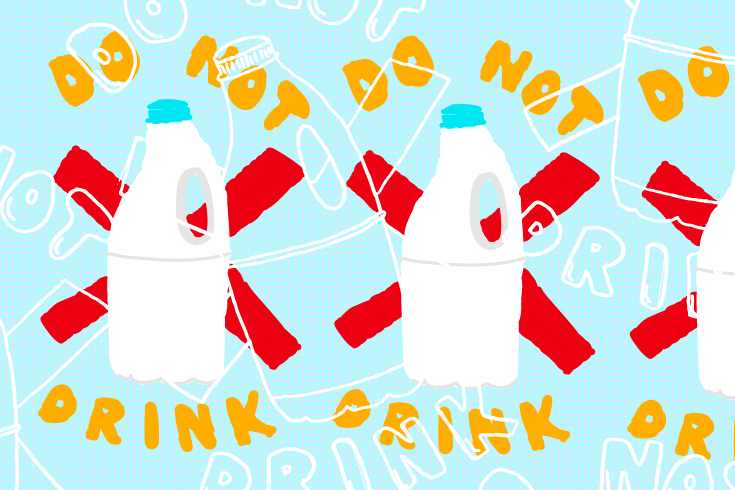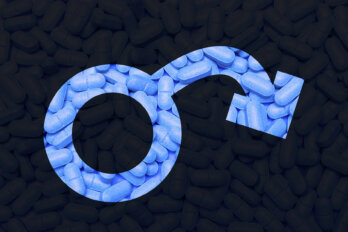John Brinkley was a huckster. During the 1920’s and 1930’s, the fake doctor transplanted goat testicles into his male patients with the promise of virility. He set up one of Kansas’s first radio stations, KFKB (Kansas First, Kansas Best), to peddle his miracle cures and services. He pushed Formula 1020, which promised to revive a moribund sex life. During a period when America was suffering a paralyzing economic depression, Brinkley’s magic surgery and miracle elixir preyed on the hope and desperation of a downtrodden public. He made millions.
Brinkley would be found out, eventually. He would have his radio licence and sham medical degrees revoked. He would be charged and convicted of fraud and would lose his amassed millions in a slew of civil cases. A judge would tell the court that Brinkley “should be considered a charlatan and a quack in the ordinary, well-understood meaning of these words.”
But the incredible thing is that, despite his phony credentials and willingness to dupe an unsuspecting public, Brinkley took on the Spanish flu with a deadly seriousness. According to Charlatan, the story of Brinkley’s life written by Pope Brock, whatever basic medical knowledge Brinkley had, he used it to treat patients suffering from the global pandemic, even petitioning the Kansas governor to provide more support for the flu victims. “They call him a quack and that just breaks my heart,” lamented one local woman whom Brinkley had helped.
“The entire performance, contrasted with the rest of his career, was so aberrant it is hard to credit,” writes Brock. “Maybe he was buying publicity. Maybe he had no choice. Whatever made Brinkley violate his charlatan code, the help he rendered during those months stands as the finest achievement of his life.”
It would be hard to say the same of the current crop of tricksters in this time of COVID-19. The pandemic has ripped through the globe and sent us scrambling to follow the directives of public health officials. Moving just as fast as real medical advice, however, are con artists hoping to use the coronavirus to make a buck or validate their worldview. Where Brinkley saw an opportunity to do good, his modern-day descendants have opted to stick to their charlatan code.
By wiping out the backward notion that illnesses like yellow fever were caused by bad smells and toxic air, germ theory led to significant increases in our lifespan and general health. Of course, growing consensus about the efficacy of modern medicine didn’t stop the naysayers. But casting them aside has, in recent years, become harder as distrust of institutions deepens. Anti-vaxers have converted believers from across the political spectrum. Fringe medical journals can put on airs of credibility to support their outlandish claims.
The internet bears a lot of blame for this, just like the growing availability of home radio sets gave Brinkley a wider audience of marks. Closed Facebook groups, video-streaming sites, do-it-yourself online stores—all have been indispensable in turning con artistry into big business. Homeopathy and so-called alternative medicines are today a multibillion-dollar industry. While there’s usually nothing necessarily wrong with natural supplements so long as they have been demonstrated as safe, the risks of unproven remedies or DIY treatments can be grave. An internal Federal Drug Administration study obtained by Scientific American found that some 370 children had adverse effects between 2006 and 2016, including eight suspected deaths, after being given a homeopathic treatment for teething.
In regular times, these kinds of scams are bad enough. During a pandemic, when the internet becomes a source of refuge for terrified self-isolationists, placebo-mongers are arguably more dangerous. While the internet giants profess concern about all the misinformation surging through their platforms, the steps they’ve taken to stop it—directing users to more reliable sources or working more closely with fact-checking partners—have clearly been inadequate. Facebook and Twitter have banned some scammers, but the jiggery-pokery of those scammers is still shared widely on social media. Take conspiracy YouTuber Jordan Sather, who tweeted to his over 140,000 followers that chlorine dioxide, a bleaching agent, would “wipe out” COVID-19. He then insisted that YouTube, where he has over 220,000 followers, “has been censoring basically every single video where I discuss it over the last year.” (Several of Sather’s videos, in which he provided his unenlightened advice on possible COVID-19 cures, remained online until quite recently.) Sather also has nearly 700 financial supporters on Patreon.
And there’s the Yummy Mummy Emporium & Apothecary, of Minden, Ontario, which also has some advice for those at risk of COVID-19. “Germs will never infect normal tissue,” their blog reads. “Viruses are non-infectious and do not exist as the magicians will have you believe.” The “mompreneur herbalist” behind the site—the Yummy Mummy YouTube page boasts over 16,000 subscribers—reaches back to some pretty archaic science to claim that environmental toxicity is the real cause of illnesses like the coronavirus. Indeed, the origin of our word for malaria (literally, Italian for “bad air”) rested on the notion that the acridity of evil odours was to blame for things like the plague. The site bluntly claims that COVID-19 “is not contagious” and asks the world to “please stop shaming people for not self-isolating.”
It’s not just the bloggers, either. Oprah’s doctor, Mehmet Oz, has used his show, Dr. Oz, to give airtime to any number of bogus medical recommendations, including gay and trans conversion therapy, reiki’s “energy healing” for use in the operating room, and green coffee-bean extract as a “magic weight-loss cure.” He is now commenting on COVID-19 for Fox News and advising the Trump administration.
Then there are the politicians. Donald Trump’s trade adviser, Peter Navarro, recently went toe-to-toe with infectious disease specialist Anthony Fauci over the then untested COVID-19 drug hydroxychloroquine, justifying his expertise to CNN by contending, “I’m a social scientist.” (Used for decades to treat and prevent malaria and some autoimmune diseases, the medication appears to have no effect against COVID-19.) Trump himself has often contradicted medical experts in areas where he has no expertise, politicizing the health of US citizens for his own ends. In March, an Arizona man died, and his wife fell gravely ill, after taking hydroxychloroquine—believing they were following the president’s advice, they ingested an aquarium cleaner that contained the ingredient. More recently, poison-control centres are imploring Americans not to drink bleach and other household cleaning products after the president speculated that such chemicals could kill the virus within an infected person.
There’s always money in saying that modern science is wrong. Yummy Mummy sells essential oils, gemstones, and other rarities. Consumers who believe that these things work on COVID-19, let alone the common cold, are indulging in wishful thinking. The shop also offers all sorts of services. For $100, you can get an hour-long consultation that will “help you get off of any medication and onto the correct lifestyle and nutrition to heal you from the root cause.” On the cheaper end, if you want “a safe way to raise your body’s energy to heal itself,” you can buy a “molecular enhancer session” for $35.
Then there’s the Abbotsford, BC, realtor who started hanging leaflets on residents’ doorknobs advertising “humic and fulvic acid” droppers as shields against COVID-19. Their website has been taken down, but a cached version of the page from March claimed they were sold out of their supposed miracle cure. (While the acids are good for plants and soil, there is no credible evidence that they fight contagion.)
The pandemic is also big business for InfoWars, the long-running fringe web-and-radio show personally endorsed by Trump. In a March 26 segment, founder Alex Jones told viewers that the COVID-19 virus was, in fact, a government-made bioweapon designed to control the masses. “So getting ready is important,” Jones said in the next breath. “Getting your immune system ready is important. Of course you want your zinc, of course you want your nanosilver.” In quick order, Jones rattled off about $500 worth of goods from the InfoWars store that, he promised, would protect against the flu and pneumonia, improve sleep, boost libido, improve energy levels, and bring a host of other benefits. (Lab tests show that InfoWars’ supplements either contain lower-than-advertised amounts of listed ingredients or are just marked-up versions of traditional supplements. Either way, the science behind their claims are spotty at best.)
Earlier in March, Jones was trumpeting his special nanosilver toothpaste, which, he said, had been endorsed by the Pentagon and Homeland Security because “this stuff kills the whole SARS-corona family at point-blank range.”
That outlandish claim earned InfoWars a cease-and-desist letter from the New York attorney general’s office, warning, “Your representation may mislead consumers as to the effectiveness [of your products] in protecting against the current outbreak.” Health officials, of course, say there is currently no approved drug or vaccine for treating or curing COVID-19. None of the promising candidates involve nanosilver, a chemical widely used for its antibacterial properties.
After that, a disclaimer was added to the InfoWars store site, squeezed between banner advertisements on deals for various supplements and bulk orders of food. “The products sold on this site are not intended for use in the cure, treatment, prevention, or mitigation of any disease, including the novel coronavirus,” it read. But that wasn’t enough for the FDA, which sent its own warning letter to InfoWars on April 9. The items mentioned in that letter—which included “SuperSilver Wound Dressing Gel”—have since been removed from the website.
Other flim-flam folks are harder to beat as they wrap themselves in the cloak of religion. A number of evangelical churches in the US have defied stay-at-home orders, citing religious liberty. Pastor Rodney Howard-Browne, who runs a Floridian megachurch and once served as a spiritual adviser to Trump, called on the White House to get people back to church by Easter. “Holding services during the pandemic, especially on Easter Sunday,” journalist Sarah Stankorb wrote on April 10, “is not just about religious freedom—it’s also about the money.” The holiday has traditionally been a big day for donations. It’s no surprise, then, that Howard-Browne swore he would never close his church, saying the members of his congregation were not “pansies.” In a March 29 Sunday sermon, he struck a defiant tone, arguing that the US constitution protects his church’s right to assemble and touting special machines that he previously said would “basically kill every virus in the place”—if someone sneezes, “it shoots it down at like 100 mph.” He was arrested the next day for holding his service against public health orders.
Howard-Browne’s Pentacostal theology revolves around the idea that the holy spirit can heal the sick. But he has also used his pulpit to push more alarming ideas. He repeated a well-worn talking point of the far right, that COVID-19 is less deadly than the flu, and rattled off other conspiracy theories resembling those on InfoWars (where he has been a guest), including that the outbreak was “planned” at a Bill and Melinda Gates Foundation event.
“They make us out to be some kook,” Howard-Browne said of media outlets. But men like him will have no trouble finding easy marks. They will keep convincing followers to reject modern science for homeopathy, news for conspiracy, religion for witch-doctor cures. Once people have converted from orthodoxy to the fringe, convincing them to part with cash isn’t much more difficult. But the risks of flouting medicine, especially in a pandemic, are incredibly severe. The fleeced might end up paying with their lives.




